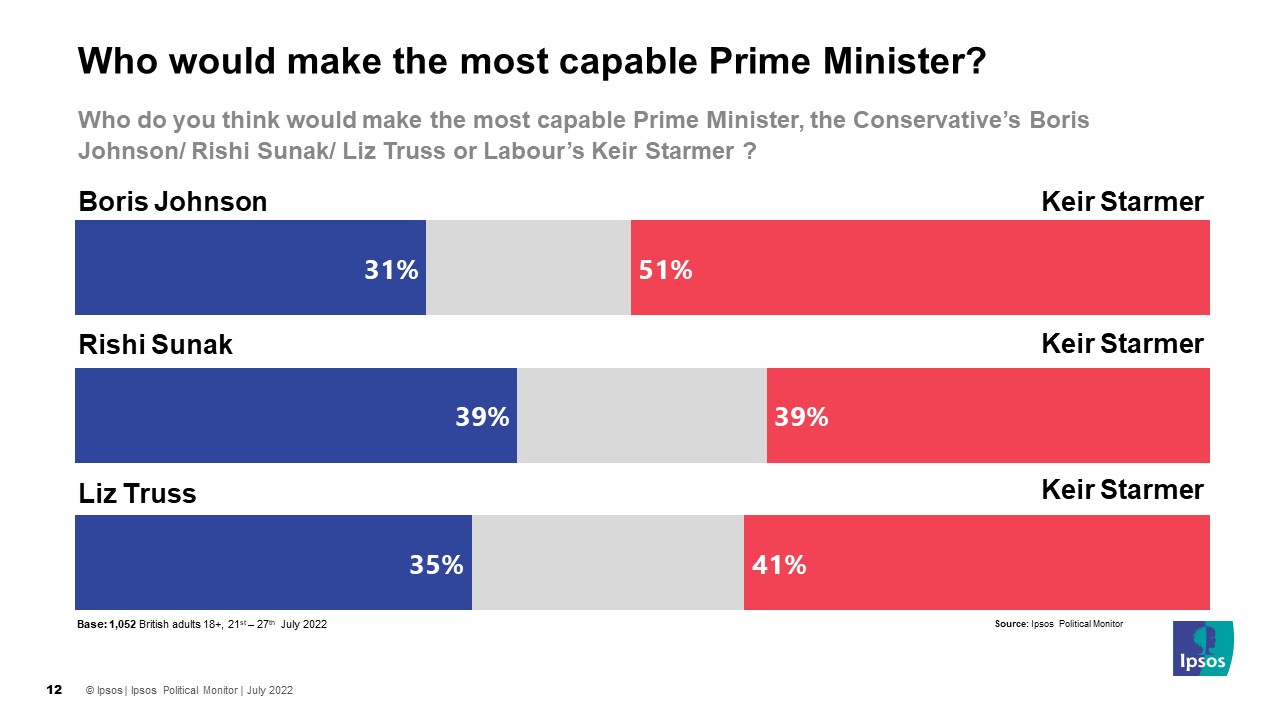Sunak ties with Starmer on most capable PM, Truss slightly behind
- Sunak also more likely to be seen as having what it takes to be a good PM, although Truss has more neutrals/don’t knows.
- Both candidates improve their position since April, with Truss reducing gap among Conservative supporters
- Labour lead in voting intentions by 44% to 30%
The latest Ipsos Political Monitor, taken July 21st to 27th, shows Rishi Sunak and Keir Starmer tied amongst the public in terms of who would make the most capable Prime Minister. Meanwhile, Liz Truss trails the Labour leader by 6 points on the same measure – although both do better than Boris Johnson. Rishi Sunak also has a slight advantage amongst the public at large and among Conservative voters in terms of being seen as ‘having what it takes to be a good Prime Minister’, but both have improved since April, with the Foreign Secretary reducing the gap among Conservative supporters.
Sunak and Truss versus Starmer
When asked who would make the most capable Prime Minister:
- Keir Starmer leads current Prime Minister Boris Johnson by 51% to 31%.
- Rishi Sunak and Keir Starmer are tied on 39% each.
- Keir Starmer leads Foreign Secretary Liz Truss by 41% to 35%.

Who has what it takes to be a good PM?
When we ask who has what it takes to be a good Prime Minister, we see little difference in Rishi Sunak and Keir Starmer’s numbers, with Liz Truss trailing slightly. However, the Foreign Secretary is less well known and has already made significant progress since the start of the year, although the former Chancellor has also recovered from his dip in April. For example:
- 35% of the public agree that Rishi Sunak has what it takes to be a good Prime Minister (+2 pts from Jan 2022) and 43% disagree (+9 pts). But this improves his position in April when only 22% felt he had what it takes.
- 33% agree that Keir Starmer has what it takes to be a good Prime Minister (+1 pt since Jan) but 41% disagree (+5 pts).
- 24% agree that Liz Truss has what it takes to be a good Prime Minister (+11 pts since Jan) and 43% disagree (+3 pts).
When we consider the views of party supporters, we see that Labour supporters are more convinced by Keir Starmer’s abilities than Conservatives are of either Rishi Sunak or Liz Truss:
- 66% of Labour supporters agree that Keir Starmer has what it takes to be a good Prime Minister (+13 pts since Jan) but 18% disagree (+1 pt).
- 49% of Conservative supporters agree that Rishi Sunak has what it takes to be a good Prime Minister (-2pts from Jan 2022) and 43% disagree (+10 pts).
- 40% of Conservative voters agree that Liz Truss has what it takes to be a good Prime Minister (+19 pts since Jan) and 34% disagree (-1 pts).
Is it clear what Starmer, Sunak and Truss stand for?
- 49% agree that they don’t know what Keir Starmer stands for (-4 pts from June), 33% disagree (+10pts)
- 40% agree that they don’t know what Rishi Sunak stands for. 44% disagree.
- 46% agree that they don’t know what Liz Truss stands for/ 33% disagree.
Voting intention (Labour lead at 14pts)
Labour 44% (+3 pts from June)
Conservatives 30% (nc)
Lib Dems 10% (-5)
Greens 8% (+2)
Others 8% (nc)
There are some signs that this may partly reflect less enthusiasm among Conservative supporters at the moment than Labour ones. 2019 Conservative voters are 3 times as likely as 2019 Labour voters to say they are undecided or would not vote for any party, and current Conservative supporters are also less likely to say they would be certain to vote (by 67% to 75%).
Keiran Pedley, Director of Politics at Ipsos UK, says of the findings:
With Labour double digits ahead in terms of voter preference and neither Liz Truss nor Rishi Sunak preferred to Keir Starmer as Prime Minister, these numbers show the scale of the challenge the new Prime Minister faces to reverse the Conservatives’ political fortunes. However, with many 2019 Conservative voters undecided and Starmer not opening up a lead over Sunak or Truss either, whoever the new Prime Minister is they will be optimistic they at least have a chance of turning things around.
Technical note
Ipsos interviewed a representative sample of 1,052 adults aged 18+ across Great Britain. Interviews were conducted by telephone: 21st to 27th July 2022. Data are weighted to match the profile of the population. All polls are subject to a wide range of potential sources of error. On the basis of the historical record of the polls at recent general elections, there is a 9 in 10 chance that the true value of a party’s support lies within 4 points of the estimates provided by this poll, and a 2 in 3 chance that they lie within 2 points. This is especially important to keep in mind when calculating party lead figures.






